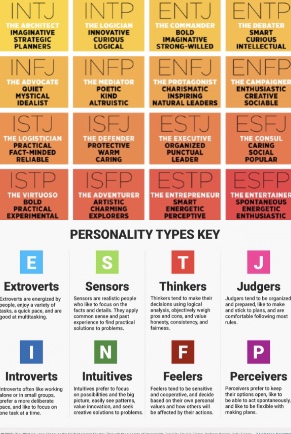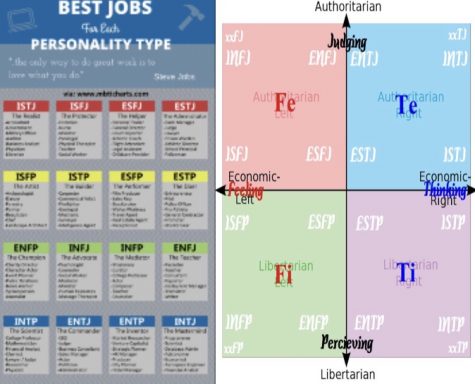The Myers Briggs Personality Test: A Lesson In Predisposition?

The Myers Briggs Personality Test categorizes your personality into sixteen different types. (edited by me.)
March 5, 2021
One of the most popular online tests is a personality called the Myers Briggs Personality Test, which determines your personality based on four key categories. Whether you are extroverted or introverted, whether you’re more sensing or intuitive, more thinking or feeling, or more judging or perceiving.
Personally, my results indicate that I am INTJ, which is an introverted, intuitive, thinking, and judging person, or put more simply, someone who the Myers Briggs website describes as an “Architect” or “Mastermind.” Not my words on the second one, but a self flattering comparison to be sure. The website also lists, “Architects derive much of their self esteem from their knowledge and mental acuity. In school, people with this personality type have been called “bookworms” or “nerds.” But rather than taking these labels as insults, many Architects embrace them. They are confident in their ability to teach themselves about and master any topic that interest them, whether that’s coding or capoeira or classical music.” All of which sound accurate to my personality.
One may look at a test like this and brush it off as a simple quiz for fun, similar to a horoscope or BuzzFeed quiz, but I think there’s a bit more to the test than just that. We have an idea that parts of your personality are largely inheritable from your parents, and that not all aspects of our personality come from environmental factors like some would have you believe.
For example, one study known as the Minnesota Study of Twins Reared Apart concluded after studying 350 pairs of twins between 1979 and 1999 that identical twins share as much of 50% of the same personality traits, despite being raised in completely different environments. As an anecdotal example, a lot of the men in my family happen to also be INTJ’s similar to myself. My dad, grandpa, and one of my uncles come to mind, demonstrating similar traits to an INTJ, which is pretty strange considering only 2% of the population are of that personality type. However, it’s not all that strange considering the information that we know about personalities nowadays.
So what are the ramifications for this fact? Well, it means that if you plan on having kids in the future, they will likely have a similar if not the exact personality type as yourself, along with whatever your wife or husband’s personality is. If an INTJ and a ISFJ have kids, the chance they have a kid that’s extroverted or perceiving is pretty slim, so if there’s any aspect of yourself that you’d like to improve or change in the next generation, you may want to look for someone who has a different personality type in that regard.
Another thing regarding relationships is that there are certain personality types that are likely predisposed to not get along, such as the INFJ and the ESTJ. The INFJ, who is introverted, intuitive, and feeling, will naturally clash with the more extroverted, sensing, and thinking personality type. Of course, the only letter they have in common is in the judging column, which means they both are likely very firm in their beliefs during arguments, but every other part of their natural tendencies are different, which will lead to numerous arguments and fights. People with these two personalities seem to be at odds naturally, through no fault of their own.
It can also impact how you view the world naturally as well. For example, those who possess the judging personality type are more likely to be conservative leaning, favoring more stability and structure in their lives, and critical of the life choices of others if they believe it is destructive to them. Those will the perceiving personality type are more likely to be liberal leaning, acting more on their emotions and the morality behind political decisions, whether they’re effective or not, and overall going with the flow of whatever people decide to do in their lives without much pushback.
In short, if there’s a “J” at the end of your personality type you’re far more likely to sympathize with conservative causes, and if there’s a “P” at the end of your personality type, you’re likely to have more liberal sentiments. Of course this is not always the case, as there are plenty of democrats with judgmental tendencies and a good amount of republicans who are open to spontaneous decisions.
According to some surveying by Personality Page, the strongest liberal personality type is the ISFP, with “40% identifying as a democrat or liberal, 34% identifying as centrist or non political, and only 18% identifying as a republican, conservative, or libertarian”. The strongest conservative personality is the INTJ, with “48% identifying as a republican, conservative or libertarian, 28% identifying as centrist or non political, and only 15% identifying as a democrat or liberal. Granted, polling and surveying isn’t everything, but it’s something to note nonetheless.

The Myers Briggs Personality Test, I think, is a testament to how much of our personalities and lives are already baked into the cake. People have this idea that everyone is some sort of blank slate, one that can be morphed and changed if we were to simply change the environmental factors around them, but I think that’s largely exaggerated. That isn’t to say that people aren’t shaped by their environment at all, but there is so much of our behavior that comes from us genetically that many of us don’t think about. More obvious examples like physical appearance, to aspects of intelligence such as IQ, and even our personality, often give us predisposed attitudes towards certain things and how our lives will pan out in the long term. So it’s less of a blank slate from birth, and more of a picture that is around 60-70 percent filled in already, with only about 30-40 percent that can still be painted. This may sound a bit bleak to you, but be assured that genetics don’t determine absolutely everything, and that you can overcome certain urges. All this means is that we find ourselves predisposed with our attitudes, not predestined. Everyone should be valued as a human being, and no one should be treated as “inferior” or “superior” due to these genetic differences, obviously.
In conclusion, the Myers Briggs Test reveals a lot about our interactions with the world and one another, and is far beyond just a test you do for fun. It tells an interesting story about the debate between nature or nurture as the primary reason for differences in human behavior, if one were to look a little deeper. It is perhaps a nice little psychological window into examining why humans act the way that they do.

